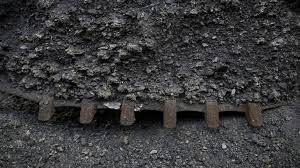Winter chill keeps China’s coal prices high, power crunch stokes inflation

China coal prices held near record highs on Thursday as cold weather swept into the country’s north and power plants stocked up on the fuel to ease an energy crunch that is fuelling unprecedented factory gate inflation.
A widening power crisis in China, affecting at least 17 regions – caused by shortages of coal, record high fuel prices and booming post-pandemic industrial demand as it shifts to greener fuels – has led to production disruption at numerous factories.
Soaring energy prices sent producer prices to their highest in at least 25 years in September, rising 10.7% from a year earlier, data showed on Thursday.
Cold winter weather is likely to worsen the situation.
China’s National Meteorological Center has forecast strong winds could knock the average temperature by as much as 14 degrees Celsius in large parts of the country this week.
Beijing has taken a slew of measures to contain coal price rises including raising domestic coal output, rationing of power at factories and assuring energy supplies will be secured for the winter heating season. [B9N2QE019]
China has approved 153 coal mines to expand capacity, expecting to add 55 million tonnes of coal supplies in the fourth quarter.
Daily coal output has reached the highest since February at more than 11.2 million tonnes, according to an official from China’s National Energy Administration on Wednesday.[L1N2R90M0]
But flooding in top coal producer Shanxi has worsened the supply outlook, with analysts expecting electricity shortages and rationing to continue into early next year.
Banks are giving loans to coal mines to support production increases. Shanxi Coking Coal Group in China’s top coal mining hub has received a 1 billion yuan ($155.30 million) bank loan for resuming operations from floods, according to a China central-bank backed newspaper on Wednesday.
“Coal supply remains very tight in northeastern China. Stocks at the power plants in the region only reached about a third of the levels in previous years,” a Jilin-based coal trader said, but added the current level is much higher than two weeks ago when some power plants were seeing near zero inventory.
The NEA official said total dispatchable coal inventory in China can support about 15 days of use.
China has also been expanding coal imports and Reuters reported last week it was releasing Australian coal from bonded storage after an nearly year-long unofficial imports ban on the fuel.
On Thursday, Russian news agency TASS reported that China asked Russia to double electricity supplies in November-December.
POWER PRICE LIBERALISATION
Earlier this week, China in its boldest step in a decades-long power sector reform said it would allow coal-fired power prices to fluctuate by up to 20% from base levels, enabling power plants to pass on more of the high costs of generation to commercial and industrial end-users.
This has raised expectations among some analysts it would encourage power generators to raise output.
However, others believe it still wouldn’t make up for the high costs of coal.
Efforts to restore power supplies in the country “relies a lot more on administrative pressure and orders than on economic incentives to power plants,” said Lauri Myllyvirta, lead analyst with the Centre for Research on Energy and Clean Air in Helsinki.
“At current coal prices, the tariff increase allowed by the wider price band is a modest sweetener at most.” Myllyvirta said adding “at 1,500 yuan a tonne, the fuel cost per kilowatt hour is 0.6 to 0.7 yuan whereas the benchmarks are generally less than 0.4 yuan per unit.”
As Beijing has reiterated that it will not undermine mining safety standards while boosting coal output, coal miners are scrambling to add investments to ensure safety at mines, potentially further boosting coal prices.
A subsidiary of Shanxi LuAn Mining Group on Thursday announced it would raise investment by 50-67% to step up safety standards at mines.
In a sign that consumer inflation is not indefinitely immune to broader price pressures, Foshan Haitian, China’s largest manufacturer of soy sauce, said this week it plans to raise prices by as much as 7% from Oct. 25 due to rising costs for raw materials, transportation and energy.
Beijing had been trying to reduce its reliance on polluting coal power in favour of cleaner wind, solar and hydro.
“Making sure people are warm and keep businesses running – that’s obvious, of course you need to that. Even as an environmentalist you don’t want to get into a situation where you risk turning society against the climate transition,” said Dimitri de Boer, chief China representative with the European environmental consultancy ClientEarth. “But that should be coupled with deploying renewables as fast as possible, to avoid similar situations in the future.”
The most-active January Zhengzhou thermal coal futures closed up 3.36% at 1,615.8 yuan per tonne on Thursday. The contract traded near record levels hit on Wednesday and have risen more than 200% year to date.
